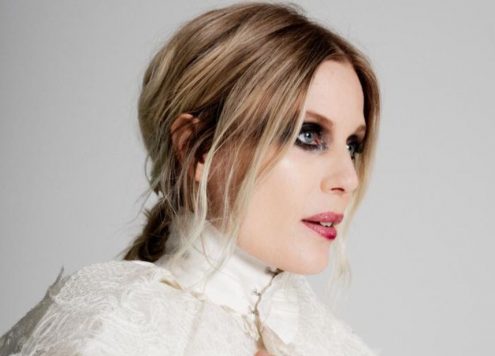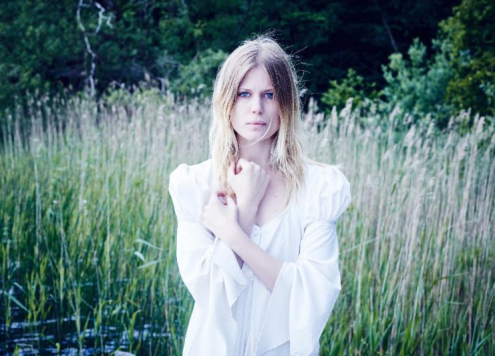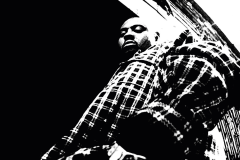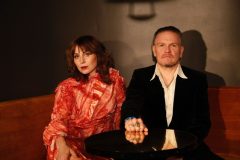I Wish To Do As I Wish; An interview with Myrkur
Emerging from the darkness of Scandinavia comes one-woman black metal project Myrkur (aka. Amalie Bruun) . Combining the rawness of second wave black metal bands like Ulver and Darkthrone with a natural sonic, ethereal beauty, Myrkur has created a wholly unique perspective on the genre.
Hailing from Denmark, Myrkur signed to renowned independent label, Relapse Records, in 2014 and released eponymous debut EP last fall. With a distinct sense of Nordic isolation, Myrkur’s debut is a feminine yet definitively brutal record that has burst onto the scene like a Valkyrie into battle. Shrouded in darkness and mystic elegance…this is black metal unlike anything that has been heard before.
Ghettoblastercaught up with her to discuss her output, contemporaries, choral music and more. This is what she told us.
Being Scadinavian seems to have an influence the music that you make and the catalysts that inspire you.
Yes, this is the truth.
Can you tell us a little bit about your introduction to metal and how you came to the realization that it would be a good platform for your ideas and musical output?
I come from a musical background of classical music. I grew up playing the violin and playing in a symphony orchestra. And also of choral singing. There really is not that big difference of classical music and black metal. It is music based on heart aching beauty combined with violent darkness. I have always carried much anger and hate within me and black metal more than any other music is a good place to express this. Instead of denying this side to myself and to life, I am willing to explore it and go deeper into it. And create from it and share it with like-minded people.
Do you acknowledge that bands like Alcest, Agalloch and Deafheaven might be your contemporaries?
I am not sure what this means. I have not listened to these bands but I have heard of them, through fans of theirs. But I cannot say if my music is similar to them, because I have not listened to it. Perhaps they were inspired by some of the same Scandinavian music that I grew up with.
Do you have an opinions on “un-black metal,” the term that seems to be attached to Christian black metal?
The term un-black metal, or Christian black metal, is in itself not a term for the musical expression that black metal springs from, but an adaption to define a statement in another perspective of the content. I’m neither interested or into that content nor the genre in itself. I’m communicating a totally different message, both musically and lyrically, that have it’s core elsewhere.
When did you begin writing the self-titled record?
I have written this music for many years and it has developed into different directions. I did not plan to ever play it for anyone or release it.
Did anyone help you to bring it to life and what influence did they have on it?
Before mixing the EP I asked my friend Rex Myrnur to help me with the drums.
What were the primary concepts or ideas were you hoping to communicate? Or was this a purely personal and cathartic endeavor?
Some people today live an unnatural life and they restrict themselves, they almost shrink themselves down to useless creature. They are not in touch with their natural state of being or with their own ancient powers. With the reflection of the asaguderne / gods in us. I try to live proactive and not reactive.
Many times you see people living accordingly to what other people’s reactions of them. Almost as if they need other humans to tell them who they are and what they like, other humans to define themselves. I wish to do as I wish. I wish to not be limited by genre definition or labels that certain people need to put upon music/people, in order to feel secure about them. But I love and respect and wish to protect the black metal community. I connect the most to black metal supporters, they tend to be the most dedicated people with authentic love for the music they listen to. The same way for people who listen to / play classical music.
You have mixed what might be some traditional choral sounds into the record? Did you grow up performing that kind of music? How did you originally discover your voice?
I suppose I discovered my voice as a young child when I first listened to the Danmarks radio’s girls choir and felt a connection to these girl choirs voices. They sang old Scandinavian songs arranged in different ways and that inspired me. Playing the violin and alongside other string instruments, has perhaps also shaped my approach to vocals. I tend to arrange these choral parts in my head and hear all the voices before I start to layer/ record them. String arrangements such as the music of Edvard Grieg or Tchaikovsky I have always listened to and sung along to. Wordless of course. I can sort of see a cello part as sung by a voice instead. And I incorporate this into other things as well, I think my guitar playing is a little different because I almost translate a melody from choral voice to guitar, which results in different textures and chord universe than the usual.
The guitar part for “Frosne Vind” sounds an awful lot like, “What Child Is This?” Was that intentional?
No. I just had to look up this song on the internet to see what you mean ha ha.
What benefits has working with Relapse afforded you as an artist?
They have given me the freedom to release music without talk of my ‘identity’ or the way I look because they understand my philosophy and approach to black metal and music in general. They help me spread the message of black metal.
Do you plan to tour in support of the effort or is Myrkur primarily a studio-based endeavor?
I wish to play concerts. I am working on how to play this music live with a band and a choir. I wish to set up a concert at Grieg Hallen with a Norwegian girls’ choir mixed with brutal metal instrumentation.
(Listen to her here: http://myrkur.bandcamp.com/.)











Social Media